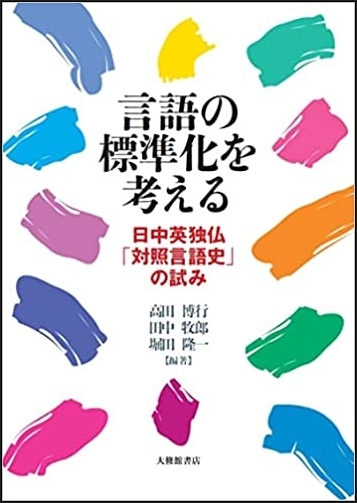昨日の記事「#5371. 言語学史のハンドブックの目次」 ([2024-01-10-1]) で紹介した The Oxford Handbook of the History of Linguistics の第15章 "Vernaculars and the Idea of a Standard Language" を開いてみた.私の研究テーマの1つに(主に近代における)英語の標準化 (standardisation) があり,本ブログでも様々に論じてきたが,言語の標準化や標準語について,こちらのハンドブックではどのような扱いがなされているかを確かめたかった.
冒頭の1段落だけですでにおもしろい.「標準語」という概念は近代ヨーロッパの発明品であり,現代ヨーロッパでは常に注目され続けてきた論題であるという.
The greatest and most important phenomenon of the evolution of language in historic times has been the springing up of the great national common languages---Greek, French, English, German, etc.---the 'standard' languages.
So wrote Otto Jespersen . . . , and the idea of a standard language has undoubtedly been one of the most seductive in the history of European linguistic thought. It has resulted in some of the most heated of debates on language matters, drawing in both academic and non-academic actors, and ranging from the learned Questione della Lingua in Italy around the turn of the sixteenth century . . . to nineteenth-century debates on how best to standardise a newly independent Norwegian . . . , to the ongoing and often passionate discussions in homes and in bars throughout the modern world about 'right' and 'wrong' usage. The notion of a standard language has underpinned language teaching and learning since the Middle Ages, based as language teaching is on the acceptance that there is a right form of a language and a wrong form. The belief in a standard has motivated much of the grammar and dictionary writing, and has also been a central ideology in the emergence and reinforcement of the modern European nations. In the period following the Renaissance, national pride was expressed through the notion that the European vernaculars were as rich and as ordered as the Classical languages. Under the influence of Romanticism this idea of the richness of the 'national common languages' was increasingly linked to a sense of there being some sort of natural relationship between a people and their language, and indeed the perceived link between language and nation, for better or for worse, remains a strong one . . . . (359--60)
英語史における近代の標準化については「#4093. 標準英語の始まりはルネサンス期」 ([2020-07-11-1]) を参照.諸言語の標準化については,私も編著者として関与した『言語の標準化を考える --- 日中英独仏「対照言語史」の試み』(大修館,2022年)を手に取っていただければ (本書についての関連記事は gengo_no_hyojunka より) .

・ Linn, Andrew. "Vernaculars and the Idea of a Standard Language." Chapter 15 of The Oxford Handbook of the History of Linguistics. Ed. Keith Allan. Oxford: OUP, 2013. 359--74.
・ 高田 博行・田中 牧郎・堀田 隆一(編著)『言語の標準化を考える 日中英独仏「対照言語史」の試み』 大修館,2022年.